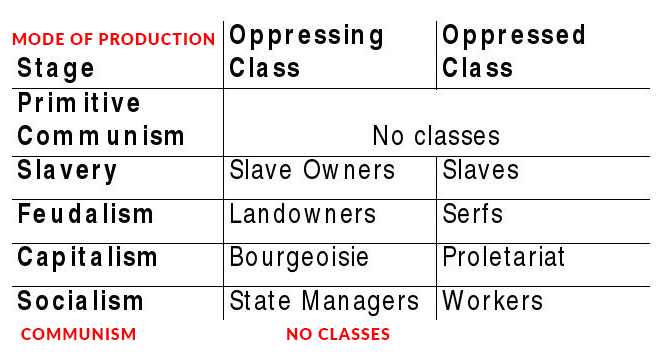- Home
- Prelims
- Mains
- Current Affairs
- Study Materials
- Test Series
 EDITORIALS & ARTICLES
EDITORIALS & ARTICLES
Evaluate Marx’s ideas on mode of production. (UPSC CSE Mains 2016 - Sociology, Paper 1)
The Mode of Production is the unity of the productive forces and the relations of production. Production begins with the development of its determinative aspect – the productive forces – which, once they have reached a certain level, come into conflict with the relations of production within which they have been developing. This leads to an inevitable change in the relations of production, since in the obsolete form they cease to be indispensable condition of the production process. Therefore, the change in the Mode of Production comes about not through people’s choice, but by virtue of the correspondence between the productive relations to the character and level of development of the productive forces.
 In his communist manifesto, Marx believes that history of all existing societies is the history of class struggle. Thus class conflict is determined by peoples association with a given mode of production and its necessary consequence. While discussing mode of production Marx advocates that any historical mode of production is an integral unity between the;
In his communist manifesto, Marx believes that history of all existing societies is the history of class struggle. Thus class conflict is determined by peoples association with a given mode of production and its necessary consequence. While discussing mode of production Marx advocates that any historical mode of production is an integral unity between the;
- FORCES OF PRODUCTION: include means of production and labour power. The forces of production express the degree to which human being control nature. The more advanced the productive forces are, greater is their control over the natural and vice versa. We can say the forces of production are the ways in which material goods are produced. They include the technological knowhow, the types of equipment in use and goods being produced, for example; tools, machinery, labour, and levels of technology are all considered to be the forces of production.
- RELATIONS OF PRODUCTION: are the social relations of production. As such, they include both, the relations between the direct producers or workers and their employers or those who control their labour, and the relations between the direct producers themselves. Relations of production is not merely the ownership of means of production. The employer’s relation to the workers is one of domination and the workers relation with co-worker is one of cooperation. Thus the relations of production can influence the momentum and direction of the development of the productive forces.
Therefore ‘forces’ and ‘relations’ of production are strongly interrelated. The development of one leads to a growing incompatibility or contradiction with the other. In fact, the contradictions between the two aspects of production ‘act as the motor of history’. The forces of production determine the super structure.









 Latest News
Latest News General Studies
General Studies